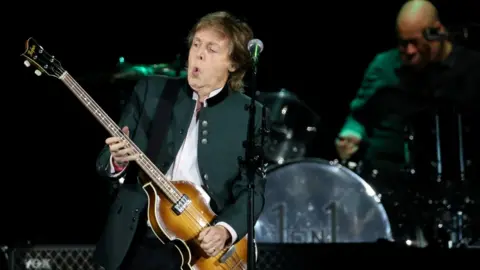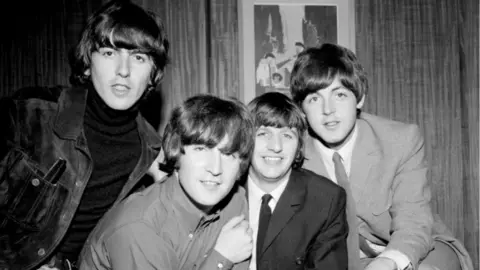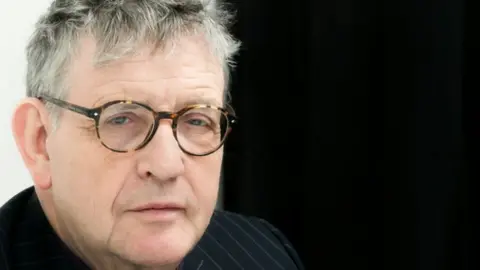Paul McCartney's new book looks at the stories behind iconic songs
 Reuters
ReutersOne is a Pulitzer-prize winning poet, the other one of the most famous people of the planet - a Beatle, no less.
Now County Armagh poet Paul Muldoon and Sir Paul McCartney have come together for a new book chronicling decades of the songwriter's work - The Lyrics: 1956 to the Present.
It includes the musician's own thoughts captured in conversation with the poet.
The two discussed the words and music that have soundtracked McCartney's life, and the lives of so many others.
The former Beatle has called the book as close to an autobiography as he will ever write.
"The story of his life is included there, but it's not the main purpose of the book," Mr Muldoon told the Good Morning Ulster programme.
"I think the main idea was really, certainly to my mind, to present Paul McCartney as a literary figure.
"One of the things I realised more and more about some of the great songwriters is that they are visual artists as much as anything."

Mr Muldoon said the Sir Paul he knows is an upbeat, optimistic person.
"As a Beatle, Paul McCartney has been on display since he was a kid and what you see and what you get is a very cheerful person - a very, I would say, joyous person," he said.
"He's a lot of fun, very amusing, laughs all the time - an optimistic person."
The poet said this often came out in the songwriting process with John Lennon.
"When he was writing with John Lennon, the image that he uses is that they were twinned, they were almost literally mirror images, one of the other," Mr Muldoon said.
"Particularly when one was playing a guitar left handed and the other right, and they were trading the lyrics back and forth.
"The kind of classic distinction between them was that Paul McCartney, put crudely, would say yes and John Lennon, put crudely, would say no."

Mr Muldoon said it would be very difficult for him to single out his favourite McCartney song.
"Probably like himself I wouldn't want to chose one child over another, I feel very connected to these lyrics," he said.
"But having said that, a song like Eleanor Rigby seems to me to be perfect the way it's constructed."
He added: "One of the things that emerged from a number of the songs was the impact of his mother's death on him.
"I'm not sure if I'd quite understood the impact of that, the sense of that that haunted him and haunts him."
'Not old and retired'
The poet said Sir Paul's later work could be an inspiration to all creative writers, including himself.
"One of the great things about him is that he has continued to write really good songs," Mr Muldoon said.
"And it's very difficult for anyone to manage this, be they poets for sure - poets find it very hard to keep on going, it's just a fact of life, which is a troubling fact of life.
"But this is a feature of all artists of a certain age, you want to deliver the goods against all the odds, you want to try and be as open to the song lyric coming along, the poem lyric coming along, just as one was with the same wide-eyed look and feeling that one had when one was 18."
In an interview for BBC Radio's This Cultural Life last month, McCartney said he had never had the time nor the inclination to write an autobiography.
"When I was a kid you always heard of great retired generals 'writing my memoirs', but I'm not old and retired," he said.
"The real reason - it's a lot of work.
"I didn't realise it [the book] was going to be that until it was all there and it was all compiled, and then people said 'well that's sort of the nearest thing to an autobiography'."
